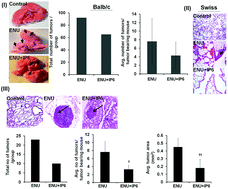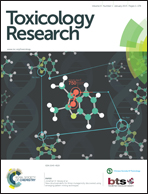N-Ethyl-N-nitrosourea-induced transplacental lung tumor development and its control: molecular modulations for tumor susceptibility in a mouse model†
Abstract
The development of lung tumors after transplacental N-ethyl-N-nitrosourea (ENU) exposure has been demonstrated in Swiss and Balb/c mice F1 mice. We also suggest the molecular changes that could be affecting the susceptibility to chemical carcinogens during tumor development in the fetus. In this study, ENU administered on the 17th day of gestation resulted in the formation of lung tumors in Balb/c F1 mice, while only lymphocytic infiltration was observed in Swiss F1 mice, at the end of three months. Molecular changes were observed in both strains, but the degree of alteration in some genes was greater in Balb/c F1 mice than in Swiss F1 mice. Administration of 2% inositol hexaphosphate (IP6) to F1 mice attenuated proliferation, inflammation and upregulated the apoptotic machinery, in terms of the expression of cyclin D1, NF-κβ p50, COX-2, mut p53, Bax, Bcl-2, and Bcl-XL including caspase enzyme activities and DNA damage. These could be important pathways involved in lung tumor development in offspring of the carcinogen-predisposed mothers; IP6 attenuated lymphocytic infiltration and tumor development by modulating these events. Analysis of the molecular changes and the chemopreventive potential of IP6 during ENU-induced transplacental lung tumorigenesis suggests that the susceptibility to the induction of lung tumors in Balb/c F1 mice could possibly be due to greater over-expression in Balb/c F1 mice than Swiss F1 mice, of genes involved in proliferation and inflammation in transplacental lung tumor development.


 Please wait while we load your content...
Please wait while we load your content...